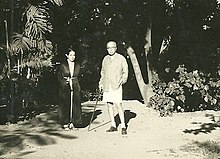| This article includes a list of references, related reading, or external links, but its sources remain unclear because it lacks inline citations. Please help improve this article by introducing more precise citations. (October 2020) (Learn how and when to remove this message) |
| Ambalal Sarabhai | |
|---|---|
 Ambalal with his daughter, the writer, Bharti Sarabhai in 1952 Ambalal with his daughter, the writer, Bharti Sarabhai in 1952 | |
| Born | (1890-02-23)23 February 1890 |
| Died | 13 July 1967(1967-07-13) (aged 77) |
| Relatives | Sarabhai family |
Ambalal Sarabhai (23 February 1890 – 13 July 1967) was an Indian industrialist, philanthropist, institution builder, and supporter of Mahatma Gandhi. He was born in a Śvetāmbara Jain and Shrimali family. He was the chairman and promoter of Calico Mills and the founder of The Sarabhai Group of Companies. He also was a participant in Indian independence movement.
Ambalal was the great-grandson of Maganbhai Karamchand (1823-64), one of Ahemdabad's wealthiest Jain financiers.
After Gandhi decided to admit an untouchable family in his Kochrab Ashram, Mangaldas Girdhardas decided to stop funding to his ashram. At this time, Sarabhai stepped up to fund this Ashram and gave ₹13000 to Gandhi, which was two years' expenses.
Personal life
In 1910, Ambalal was appointed by the government to the Ahmedabad municipality at the age of twenty-one. He wed Sarladevi that same year; she was the educated daughter of a lawyer who worked in Rajkot. Ambalal set sail for England in 1912 on a ten-month voyage, with some goals of learning about the textile business and some of the country's culture. Ambalal was getting ready to turn the Ahmedabad Manufacturing and Calico Printing Company Limited, his family's business, into the biggest, most advanced textile mill in the metropolis. His spouse, their infant daughter Mridula, and several friends and relatives traveled with him.
Ambalal and his family lived the life of upper-class English aristocrats with an English butler, chauffeur, valet, and maid in a rented house in Richmond.
Ambalal Sarabhai's family earned the informal title 'Medici of Ahmedabad' for their role in the city development with their progressive views on the culture and politics of the city.
Career
In 1922, Ambalal installed in the Calico Mills a complete fine- count spinning, weaving, and processing mill.
See also
References
- AMRITA SHAH. VIKRAM SARABHAI - A LIFE (in Sanskrit).
- Spodek, Howard. Ahmedabad: Shock city of twentieth century India. Orient Blackswan. ISBN 9788125046615.
- Guha, Ramchandra (2018). Gandhi: The Years That Changed the World. Penguin Allen Lane. ISBN 978-0670083886.
- Spodek, Howard. Ahmedabad Shock City of 20th century India. Orient Black Swan. ISBN 9788125046615.
- Spodek, Howard. Ahmedabad Shock City of 20th century India. Orient Black Swan. ISBN 9788125046615.
- Basu Aparna, As Times Change. Sarabhai Foundation, 2018. p 115, 123, 124
- M. V. Kamath & V. B. Kher, The Story of Militant But Non-Violent Trade Unionism. Navajivan Trust. 1993. p 37
- Edwin Mortimer Standing, Indian Twilight. Bharati Sarabhai Charity Trust. 1967.
- Howard Spodek, Ahmedabad: Shock City of Twentieth-Century India. Orient Blackswan Private Limited. 2012. p 37, 38, 39, 40, 121–139.
- Erikson, Erik H. Gandhi's Truth: On the Origins of Militant Nonviolence. Faber and Faber Limited. 1970. p 296–303.
- Amrita Shah, Vikram Sarabhai: A Life. Penguin Books. 2016. p 6–13, 27, 29, 40, 45, 54, 66, 77–78, 91, 93, 99–100, 102, 104, 141, 164, 210.
- Kenneth L. Gillion. Ahmedabad: A Study In Indian Urban History. University of California Press Berkeley and Los Angeles. 1968. p 86,87, 170
- Dwijendra Tripathi and Makarand Mehta. Business Houses in Western India: A Study in Entrepreneurial Response 1850- 1956. Manohar Publications. 1990. p 92
- Tirthanker Roy. A Business History of India: Enterprise and the Emergence of Capitalism from 1700. Cambridge University Press. 2018. p 146, 171, 192
- Amrita Shah. Ahmedabad: A City in the World. Bloomsbury Publishing India. 2015
- Kalia,Ravi. Gandhinagar: building national identity in postcolonial India. University of South Carolina. 2004. p 43–45, 50, 51, 53.
- Businesspeople from Ahmedabad
- People from Vadodara
- 1890 births
- 1967 deaths
- People from Gujarat
- Recipients of the Kaisar-i-Hind Medal
- Indian businesspeople in textiles
- Gandhians
- Indian philanthropists
- Indian independence activists from Gujarat
- Founders of Indian schools and colleges
- Gujarati people
- Sarabhai family
- Jain Indian independence activists